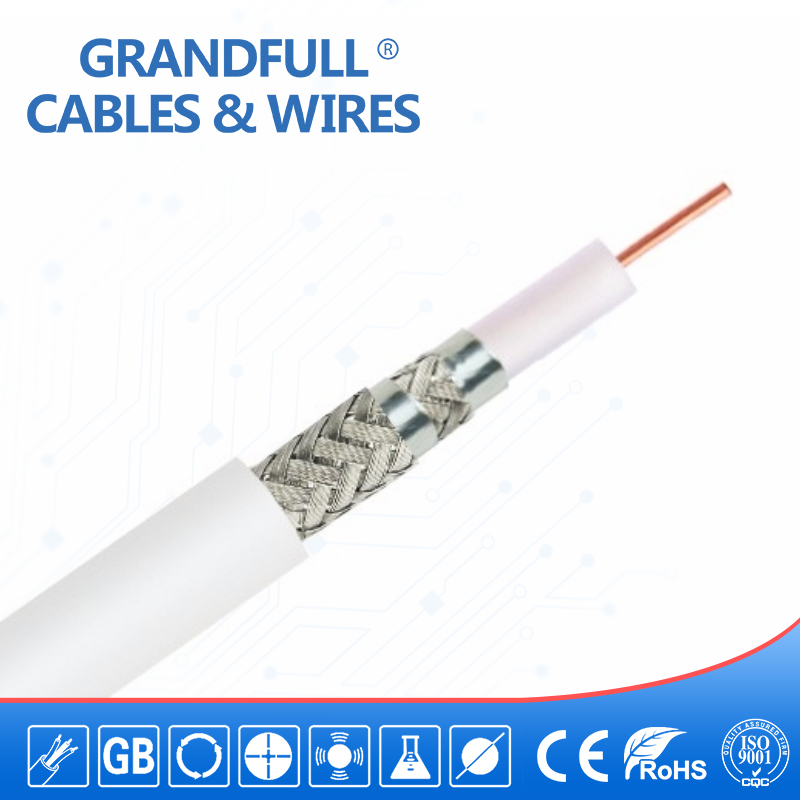
What is Coaxial Cable?
Coaxial cable, sometimes known as coax cable, is an electrical cable which transmits radio frequency (RF) signals from one point to another.
The technology has been around since the early 20th century, with these cables mainly being used to connect satellite antenna facilities to homes and businesses thanks to their durability and ease of installation.
What is RG cable?
There are different types of coaxial cable, which vary by gauge and impedance. Gauge refers to the cable’s thickness and is measured by the radio guide measurement or RG number. The higher the RG number, the thinner the central conductor core is.
What does a Coaxial Cable look like?
Coaxial cable has a distinct thick, round shape because of its interior insulation layer. Its size makes it look very different to other types of cable, such as twisted pair or Ethernet cable.

Coaxial cable types
Coaxial cables are available in a variety of colours including black, brown and white.
How do Coaxial Cables work?
Coaxial cables are a popular choice because their shielded design allows the centre conductor to transmit data quickly while being protected from damage and interference.
Coaxial cables are mainly built up of these four different layers:
1. A centre conductor which is usually a copper wire, which data and video travels through
2. Surrounding the copper wire is a dielectric plastic insulator
3. A braided mesh made from copper then helps to shield the cable from electromagnetic interference (EMI)
4. The external layer is a plastic coating which protects the internal layers from damage
Coaxial cable works by carrying data in the centre conductor, while the surrounding layers of shielding stop any signal loss (also called attenuation loss) and help reduce EMI.
The first layer, called the dielectric, provides distance between the core conductor and the outer layers, as well as some insulation.
The next layers, collectively referred to as the shield, keep electrical impulses and radio transmissions out.
What is the transmission speed of Coaxial Cable?
The transmission speed of coaxial cable is 10Mbps (megabits per second), and they offer 80 times more transmission capacity than twisted pair cables.
Coaxial cable advantages and disadvantages
Advantages of coaxial cable
Inexpensive
Easy to wire and install
Easy to expand
Good resistance to EMI
Up to 10Mbps capacity
Durable
Another benefit of coaxial cable is the electromagnetic field carrying the signal exists only in the space between the inner and outer conductors. This means coaxial cable can be installed next to metal objects without losing power, unlike other types of transmission lines.
Disadvantages of coaxial cable
The main disadvantage of using coaxial cable is that single cable failure can take down an entire network.
Coaxial cable types
There are two main types of coaxial cables – ones with an impedance of 75 Ohm (Ω) and ones with an impedance of 50 Ohm.
Cables with 75 Ohm are mostly used for video signals, while 50 Ohm cables tend to be used for data and wireless communications.
In coaxial cables, Ohm refers to the impedance, which is the measure of resistance in the cable to the flow of electrical energy.
What’s RF coaxial cable?
RF coaxial cables are used to carry radio frequency signals. They’re the standard input cable on TVs and feature a single pin which plugs into the RF input on a device.
What’s RG-6 cable?
RG-6 cables have larger conductors, so they provide better signal quality. They have thicker dielectric insulation and are made with a different kind of shielding, allowing them to handle GHz level signals more effectively. As this type of cable is thin, it can also be easily installed in walls or ceilings.
What’s RG-59 cable?
A common cable in domestic settings, RG-59 cable is similar to the RG-6, but it has an even thinner centre conductor. This makes it a good choice for short runs and low-frequency transmissions.
What’s RG-11 cable?
RG-11 cable is easily identifiable as it’s thicker than other types of coaxial cable, which can make it more difficult to work with. However, it offers a lower attenuation level than RG-6 or RG-59, meaning it can carry data for longer distances.